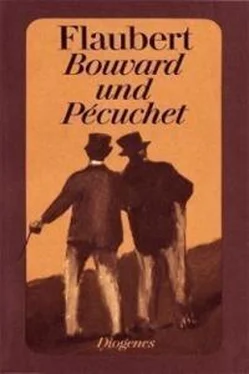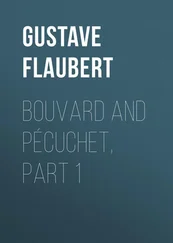What, then, is hygiene? "Truth on this side of the Pyrenees, error on the other side," M. Levy asserts; and Becquerel adds that it is not a science.
So then they ordered for their dinner oysters, a duck, pork and cabbage, cream, a Pont l'Evêque cheese, and a bottle of Burgundy. It was an enfranchisement, almost a revenge; and they laughed at Cornaro! It was only an imbecile that could be tyrannised over as he had been! What vileness to be always thinking about prolonging one's existence! Life is good only on the condition that it is enjoyed.
"Another piece?"
"Yes, I will."
"So will I."
"Your health."
"Yours."
"And let us laugh at the rest of the world."
They became elated. Bouvard announced that he wanted three cups of coffee, though he was not a military man. Pécuchet, with his cap over his ears, took pinch after pinch, and sneezed without fear; and, feeling the need of a little champagne, they ordered Germaine to go at once to the wine–shop to buy a bottle of it. The village was too far away; she refused. Pécuchet got indignant:
"I command you—understand!—I command you to hurry off there."
She obeyed, but, grumbling, resolved soon to have done with her masters; they were so incomprehensible and fantastic.
Then, as in former days, they went to drink their coffee and brandy on the hillock.
The harvest was just over, and the stacks in the middle of the fields rose in dark heaps against the tender blue of a calm night. Nothing was astir about the farms. Even the crickets were no longer heard. The fields were all wrapped in sleep.
The pair digested while they inhaled the breeze which blew refreshingly against their cheeks.
Above, the sky was covered with stars; some shone in clusters, others in a row, or rather alone, at certain distances from each other. A zone of luminous dust, extending from north to south, bifurcated above their heads. Amid these splendours there were vast empty spaces, and the firmament seemed a sea of azure with archipelagoes and islets.
"What a quantity!" exclaimed Bouvard.
"We do not see all," replied Pécuchet. "Behind the Milky Way are the nebulæ, and behind the nebulæ, stars still; the most distant is separated from us by three millions of myriamètres." [7] A myriamètre is over six miles.—TRANSLATOR.
He had often looked into the telescope of the Place Vendôme, and he recalled the figures.
"The sun is a million times bigger than the earth; Sirius is twelve times the size of the sun; comets measure thirty–four millions of leagues."
"'Tis enough to make one crazy!" said Bouvard.
He lamented his ignorance, and even regretted that he had not been in his youth at the Polytechnic School.
Then Pécuchet, turning him in the direction of the Great Bear, showed him the polar star; then Cassiopeia, whose constellation forms a Y; Vega, of the Lyra constellation—all scintillating; and at the lower part of the horizon, the red Aldebaran.
Bouvard, with his head thrown back, followed with difficulty the angles, quadrilaterals, and pentagons, which it is necessary to imagine in order to make yourself at home in the sky.
Pécuchet went on:
"The swiftness of light is eighty thousand leagues a second; one ray of the Milky Way takes six centuries to reach us; so that a star at the moment we observe it may have disappeared. Several are intermittent; others never come back; and they change positions. Every one of them is in motion; every one of them is passing on."
"However, the sun is motionless."
"It was believed to be so formerly. But to–day men of science declare that it rushes towards the constellation of Hercules!"
This put Bouvard's ideas out of order—and, after a minute's reflection:
"Science is constructed according to the data furnished by a corner of space. Perhaps it does not agree with all the rest that we are ignorant of, which is much vaster, and which we cannot discover."
So they talked, standing on the hillock, in the light of the stars; and their conversation was interrupted by long intervals of silence.
At last they asked one another whether there were men in the stars. Why not? And as creation is harmonious, the inhabitants of Sirius ought to be gigantic, those of Mars of middle stature, those of Venus very small. Unless it should be everywhere the same thing. There are merchants up there, and gendarmes; they trade there; they fight there; they dethrone kings there.
Some shooting stars slipped suddenly, describing on the sky, as it were, the parabola of an enormous rocket.
"Stop!" said Bouvard; "here are vanishing worlds."
Pécuchet replied:
"If ours, in its turn, kicks the bucket, the citizens of the stars will not be more moved than we are now. Ideas like this may pull down your pride."
"What is the object of all this?"
"Perhaps it has no object."
"However―" And Pécuchet repeated two or three times "however," without finding anything more to say.
"No matter. I should very much like to know how the universe is made."
"That should be in Buffon," returned Bouvard, whose eyes were closing.
"I am not equal to any more of it. I am going to bed."
The Epoques de la Nature informed them that a comet by knocking against the sun had detached one portion of it, which became the earth. First, the poles had cooled; all the waters had enveloped the globe; they subsided into the caverns; then the continents separated from each other, and the beasts and man appeared.
The majesty of creation engendered in them an amazement infinite as itself. Their heads got enlarged. They were proud of reflecting on such lofty themes.
The minerals ere long proved wearisome to them, and for distraction they sought refuge in the Harmonies of Bernardin de Saint–Pierre.
Vegetable and terrestrial harmonies, aërial, aquatic, human, fraternal, and even conjugal—every one of them is here dealt with, not omitting the invocations to Venus, to the Zephyrs, and to the Loves. They exhibited astonishment at fishes having fins, birds wings, seeds an envelope; full of that philosophy which discovers virtuous intentions in Nature, and regards her as a kind of St. Vincent de Paul, always occupied in performing acts of benevolence.
Then they wondered at her prodigies, the water–spouts, the volcanoes, the virgin forests; and they bought M. Depping's work on the Marvels and Beauties of Nature in France . Cantal possesses three of them, Hérault five, Burgundy two—no more, while Dauphiné reckons for itself alone up to fifteen marvels. But soon we shall find no more of them. The grottoes with stalactites are stopped up; the burning mountains are extinguished; the natural ice–houses have become heated; and the old trees in which they said mass are falling under the leveller's axe, or are on the point of dying.
Their curiosity next turned towards the beasts.
They re–opened their Buffon, and got into ecstasies over the strange tastes of certain animals.
But all the books are not worth one personal observation. They hurried out into the farmyard, and asked the labourers whether they had seen bulls consorting with mares, hogs seeking after cows, and the males of partridges doing strange things among themselves.
"Never in their lives." They thought such questions even a little queer for gentlemen of their age.
They took a fancy to try abnormal unions. The least difficult is that of the he–goat and the ewe. Their farmer had not a he–goat in his possession; a neighbour lent his, and, as it was the period of rutting, they shut the two beasts up in the press, concealing themselves behind the casks in order that the event might be quietly accomplished.
Each first ate a little heap of hay; then they ruminated; the ewe lay down, and she bleated continuously, while the he–goat, standing erect on his crooked legs, with his big beard and his drooping ears, fixed on her his eyes, which glittered in the shade.
Читать дальше








![Гюстав Флобер - Закат Карфагена [Сборник]](/books/414440/gyustav-flober-zakat-karfagena-sbornik-thumb.webp)


